Thanks for your support! If you make a purchase using our links in this article, we may make a commission. And, as an Amazon Associate, I earn from qualifying purchases. See the full disclosure here.
Truck camper owners tend to be a sturdy breed, more eager for adventure than the average RVer, and more willing to wander off the beaten track. This thirst for wilderness requires a different set of accessories be packed into the camper before you set off on your truck camper adventure. So, we created our list of 25 Essential truck Camper Accessories.
Yes, you’ll still need that special RV toilet paper, and don’t leave the camp chairs at home. But some special preparations can ensure that your trip into the backcountry is memorable for the fun, not the boondoggles. We’ve compiled a list of gear for truck camping life that will help you meet any situation with confidence, keep you safe, and prepare you to deal with emergencies as they arise. We’ve also included some things to take along that will make your truck camping and experience more enjoyable.
So, read on to see our list of 25 Essential Truck Camper Accessories.
1. Truck Camper Tie-Downs and Turnbuckles
Starting at the most fundamental level, your first step is to make sure your truck and your camper won’t part company when you least expect it. Campers are secured to a truck using a system of tie-downs and turnbuckles positioned at the front and rear of the camper. Tie-downs can attach to the truck’s bed or the truck’s frame, but frame mounts are stronger. Specific styles of tie-downs are made for most truck models and also tie-downs for a truck camper on a flatbed.
Tie-downs that connect to the truck bed may bolt into place or clamp onto the rails, the bed’s front wall, or the trailer hitch in the back. Tie-downs that bolt to the frame provides a lower attachment to your truck, increasing stability and improving handling. Not all vehicles can be fitted with frame-mounted tie-downs, so it’s okay to mix types, using frame-mounted tie-downs at one end of the camper and bed-mounted at the other.
Turnbuckles connect the anchors built into your camper to the tie-downs on your truck. Turnbuckles meant to attach to a frame-mounted tie-down are typically longer than those intended for use with a bed-mounted tie-down.
There are various styles of turnbuckles available, including cushioned and spring-loaded models. Check with your camper’s manufacturer to see which type is recommended.
Spring-loaded turnbuckles adjust to changing tensions as your truck camper travels, but can only be used with frame-mounted tie-downs.
Several types of turnbuckles release quickly and easily, which is an important feature if it has to be removed to reach the gas cap or to lock down. There are also styles with tension indicators so the turnbuckles aren’t over-tightened, which could cause damage to the camper and/or truck. A Stabilizer Bar, which helps distribute the camper load, is recommended for most trucks.
2. Lifting Jacks and Stabilizers for Truck Campers
These are a bit different from the vehicle jacks familiar from numerous flat tire experiences. The camper jacks steady and support the camper when parked or in some cases when separated from the truck bed. They come in several different styles. Some models are now equipped with Truck Camper Electric Jacks.
Scissor jacks can be permanently bolted to the underside of the truck frame or can be used to lift the unit for maintenance, flat tires, etc. Camper jacks that resemble extendable legs are mounted on each corner of the camper by brackets and can be used when the camper is either on and off the truck. If you have a dually truck, you’ll need special swing-out brackets to clear the fender flares.
3. Truck Camper Bed Mat
Put a rubber truck bed mat under your camper. It will keep it from sliding around while mounted on the truck. A hard bed liner is not recommended, as it can cause your camper to bounce. Truck Camper bed mats are made for every type of truck imaginable including short bed campers and flatbed truck campers.
4. Trailer Hitch and Hitch Extender for Pickups with Truck Campers
If you plan to tow anything or carry a bike rack or cargo carrier, you’ll need a trailer hitch. Most trucks come equipped with one, but if your camper hangs over the back of your truck (and many do), you’ll need a hitch extender. Keep in mind that extending your hitch may significantly impact the amount of weight you can carry or haul. To tow, you’ll also need several accessories, including safety cables, a power cord to connect the vehicles, and a padlock.
5. Hitch Carriers
A variety of carriers are available to mount on your hitch to carry bicycles, spare tires, motorcycles, extra batteries or cargo of any kind. You can also mount a grill on your hitch.
6. Wiring Extension
Many trucks come pre-installed with 7-way trailer connector on the back. A wiring extension allows you to plug your camper into the trailer connection to power the external lights on your camper. This is vital if your camper overhangs the back of your truck concealing the truck’s rear lights.
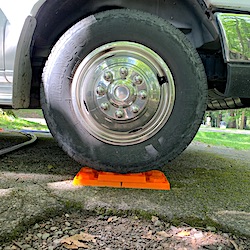 7. Leveling Blocks
7. Leveling Blocks
Leveling your truck camper is essential, as it is for any RV with an onboard refrigerator. Camping on an uneven slope will dramatically shorten the life of your’ fridge. We recommend these Tri-Lynx Leveling blocks in bright orange.
8. Refrigerator Thermometer and Level
Keep your camper fridge healthy by checking to see if it is level every time you set up camp. Keep yourself healthy by checking that food in your refrigerator is being kept at a safe temperature, 38 to 40 degrees Fahrenheit.
9. Electrical Adapter
A 30 amp female to 15 amp male adaptor comes in handy, especially if you’re spending some time parked in a driveway. Add a long, heavy-duty extension cord, and you’ll be able to plug in just about anywhere.
10. Portable Air Compressor
If you plan to do much off-roading or driving in sand, letting the air out of your tires is the best way to avoid getting stuck. However, you’ll need to re-up your tire pressure before you return to the pavement. A portable air compressor is the answer. Models that connect directly to your battery are the fastest and most powerful. Other types plug into your 12-volt system.
11. Fire Extinguisher
Most campers come with these pre-installed, but you should test yours before every trip, and make sure everyone knows how it is used.
12. Extra Batteries and Inverter
Many truck campers enthusiasts find they need additional battery power to remain off-grid while enjoying their electronics and appliances. Two solutions to carry spare batteries are on an auxiliary mount underneath the truck camper or on a hitch extension. You may also need an inverter to convert 12 volts to 120-volt power.
13. Tactical Flashlights and Camping Lanterns
These can be either solar powered or battery operated but need to be bright. Be sure to bring plenty of batteries along if you go that route. Many RVers find that headlamps are a great addition, especially when setting up camp after dark.
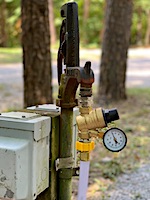 14. RV Water Pressure Regulator
14. RV Water Pressure Regulator
Many public sources of water, even faucets in campgrounds, have high water pressures that will damage your camper plumbing. A water pressure regulator that screws onto your hose lowers the pressure to safe levels.
15. Mobile Hotspot
These are great for staying connected on the road. You may be able to activate one on your smartphone, or you can buy a separate unit. You may also need a cell phone signal booster. Be aware that cell phone coverage is not as all-encompassing as various companies would have you believe. Some truck campers carry a short-wave radio as a backup.
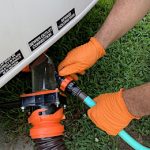 16. Dump Station Necessities
16. Dump Station Necessities
For the all important dumping of the tanks ritual, you’ll need rubber gloves, a bucket, a hose used only for flushing out the black and grey water tanks (use a separate hose to fill your freshwater tank), and some RV holding tank treatment. You may also want a low foldable stool to sit on while you complete the operation. If you have a cassette toilet, a gray water drain adapter allows you to use a standard water hose rather than a regular sewer hose to empty your tanks.
17. Navigation System
GPS enabled tablets, and smartphones have changed the way we get to our destination. However, they still aren’t infallible. Paper maps make a great backup when you need a second opinion on the correct route.
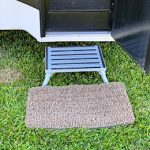 18. Door Mat
18. Door Mat
A grass Door Mat outside your truck camper door will keep down the dirt, twigs, pebbles, and thorns that get tracked in.
19. First Aid Kit
Injuries and illness can strike at any time, and help may be many miles away. A fully equipped first aid kit in your truck camper lets you cope with emergencies both small and large. A good first aid kit might be the most important item in our list of 25 Essential Truck Camper Accessories. Several good commercial first aid kits are available. Or you can assemble your own. Recommended contents include:
 Adhesive bandages in several sizes
Adhesive bandages in several sizes- A role of sterile gauze and sterile dressing pads
- Butterfly closures and adhesive tape
- Superglue (to close deep cuts)
- Cotton-tip swabs
- Alcohol wipes
- Packets of ammonia inhalant
- Thermometer
- Tweezers
- Scissors
- Safety pins
- Moleskin (to prevent blisters)
- Ankle and wrist braces
- Arm sling or material to make one
- Cold compress packs (for swelling or heat exhaustion)
- Latex or disposable nitrile gloves
- Disposable face masks (at least one for each party member) to protect against infection, smoke inhalation, etc.
- Aspirin (for heart emergencies) and other painkillers of choice
- Benadryl (for allergic reactions) and another antihistamine of choice
- Other medications and copy of the prescription
- Imodium 2 mg tablets (for diarrhea)
- Laxative of choice
- Antacid of choice
- Electrolyte packets (for dehydration and heat exhaustion)
- Water purifier tablets
- Antibiotic ointment
- Burn cream or aloe gel
- Anti-itch hydrocortisone 1% cream
- Calamine lotion (for areas with poison ivy, oak, and sumac)
- Hand sanitizer
- Space blanket (for shock or hypothermia)
- Accident report forms or pen and pad to record details of illness/accident
- Small flashlight (for examining eyes, ears, throat)
- Spark-Fire Firestarter or lighter and tinder
- First Aid instruction booklet (for when you can’t get online)
- Other suggested items: resealable plastic bags (to make ice packs), tampons (to absorb blood or start a fire), zinc spray for sore throats
20. Roadside Emergency Kit
Breakdowns are a fact of life, although no one has yet explained why they always seem to happen in the worse weather or far from help. For those truck campers who plan on venturing beyond the scope of highway rescue services, an emergency roadside kit is a true necessity.
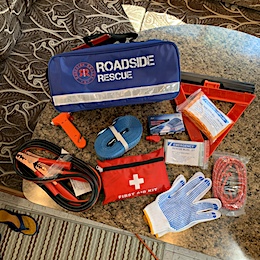 Tire repair kit and jack
Tire repair kit and jack- Can or two of Fix-a-flat
- Lug nut wrench
- Tool kit with screwdriver, pliers, hammer, adjustable wrench
- Tire pressure gauge
- Signal flares, glow sticks and/or warning triangles
- Tow strap (for when you need to be pulled out of the sand or mud)
- Silicone repair tape (to fix radiator hoses)
- Jumper cables
- Duct tape
- Electrical tape
- 12-volt fuses for both camper and truck
- Reflective vest
- Zip ties
For travel in winter or through mountains, add snow chains, an ice scraper, a bag of kitty litter for traction, a folding shovel, a thermal blanket, and winter weight hat and gloves.
21. Truck Camper Cover
Keep your camper clean and dry with a cover designed especially for truck campers. These come in various sizes and often include a panel that opens to provide access to the camper’s inside.
Nice To Have
While these items are by no means necessary, many of those who travel in truck campers find they make life more enjoyable.
22. Alternate Energy Source
Before heading off into the boondocks, get a portable solar panel to help keep everything working. Many truck campers are entirely powered by solar panels, but even a small solar panel is helpful to charge cellphones, tablets, and laptops.
Another option for off-grid power is a wind turbine. Miniature models built for RVs will keep your batteries charged even in overcast conditions.
23. Tire Deflator
For off-roading, especially in the sand, you need to let the air out of your tires. Easier said than done, but this little device makes the process fast and easy.
24. 12-Volt Fan
One of these will keep your truck camper cool, and to get rid of damaging humidity.
25. Hitch-Mount Security
Needless to say, you should always have a spare set of keys to both your camper and truck with you when you set out for an adventure. Where to securely hide them is the problem. Most go the magnetic box route, but a new option is a little, push-button operated safe that fits right into your trailer hitch.
Our list doesn’t cover the camp chairs and table, grill, mosquito netting or awning, and LED rope lights that can make your campsite your own personal oasis. Another list would cover all the equipment for your camper kitchen and sleeping area. Remember that, with the limited space in a camper, you need to keep your equipment to a minimum, look for compact space-saving items and leave about half of what you think you need at home.
For more information about truck campers check out some of our related articles below!
- Is it Legal to Ride In a Truck Camper or 5th Wheel?
- 7 Awesome Reasons to Buy a Flatbed Truck Camper
- What’s the Average Discount When Buying an RV Through Costco?
- The 5 Best RV Campground Memberships
- 21 Best RV Campgrounds on the Beach | East Coast Guide
Do you have any essential items that you would like to add to our list of 25 Essential Truck Camper Accessories? Please leave your suggestions below!

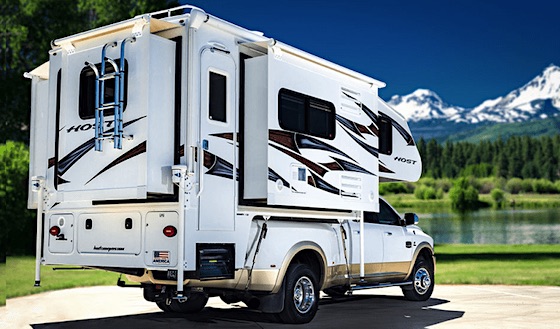

Please do not recommend Fix-a-flat. (1) It doesn’t always work. (2) It can make a mess inside the wheel that is difficult to clean. (3) Tire technicians don’t recommend it — in fact they hate it. (4) It is dangerous, especially when deflating the tire.
Instead, use a tire plug kit and a 12v air compressor.
Practical (not Tactical) Flashlights, especially with a magnetic base.
__ Tire plug kit
__ Spare headlight bulbs because you can’t drive at night without light, especially in the middle of nowhere.
__ Multimeter (DVOM) to check 12v supplies and diagnose ptoblems.
__ Pocket knife (like Victorinox Huntsman, Mountaineer, or Ranger).
__ Multitool (like Leatherman Wave+).
__ Small slip joint pliers (like Channel Locks) to pull hard to hold thinks and work inside small places, especially for plumbing.
__ Ratcheting screwdriver with bits and sockets for loosening and tightening screws and nuts.
__ Ratcheting wrench set to fit in tight spaces and hold the opposite end of a bolt.
__ Hex (Allen) wrench set
__ Small thin pry bar with right angle end to fit in tight spaces and open stuck hatches or make repairs.
__ 16oz. ball peen hammer when something needs a little extra persuasion.
__ Polyurethane glue (Gorilla Glue) because it sticks to almost everything.
__ Wax paper because polyurethane glue doesn’t stick to it.
__ Petroleum jelly (Vaseline).
__ Baking soda.
__ Vinegar (also in a spray bottle).
__ Silicon spray and grease (plumber’s grease) for lubrication and protecting rubber.
__ Liquid Wrench (or acetone and ATF).
__ Quart (or two) of motor oil.
__ Tool box/bag (or two) to keep everything together.